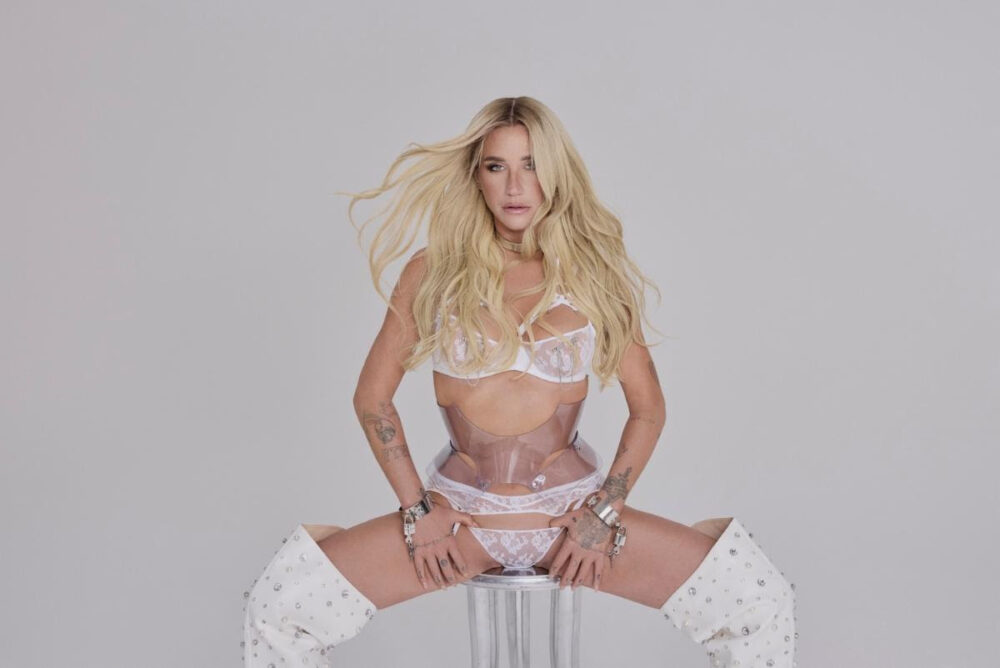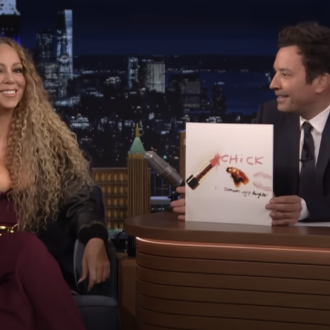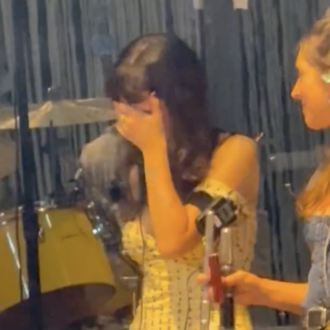With Period, Kesha Cashes In On The Sleazy Pop Blueprint She Pioneered

Few people in pop music have earned a comeback more than Kesha Sebert. For over a decade, her career has been defined by producer and ex-collaborator Lukasz Gottwald, a man she openly despises with good reason. Kesha sued the producer, better known as Dr. Luke, in 2014, accusing him of rape and psychological abuse. (The case was settled in 2023.) Yet her music was still bound to him both literally — she didn’t get out of her contract with Luke’s Kemosabe Records until 2023 — and figuratively. Sometimes that subtext was intentional, as on diss track “Praying,” or the title of her final Kemosabe album, Gag Order (since renamed Eat The Acid).
Kesha now has her own label, the bluntly named Kesha Records, and her first Luke-unencumbered album, Period. (The album’s actual title is stylized, Ed Sheeran-style, as “.” We will not be doing that.) She is now free — she released Period, pointedly, on Independence Day — and she’s been using that freedom to make some of the most genuinely fascinating music of her pop cohort. Even more impressively, that music’s been fascinating in multiple directions. The druggy Southern gothic ballad “Eat The Acid,” cowritten with her mother Pebe Sebert, has almost nothing in common with the accordion clown fiesta of lead Period single “Joyride” besides being idiosyncratically, unmistakably Kesha.
Period intro track and thesis statement “Freedom” is indulgent in the best way: Kesha laughing in the face of conventional streaming-age wisdom by waiting a full two minutes and thirty seconds of ambient New Age vocalizing before dropping a beat. That beat is great, a piano house track with a gospel chorus and genuine funk; it’s also a hotel room that Kesha gleefully proceeds to exhilaratingly trash: “Take me to the sex shop, bitch!” Its outro counterpart, “Cathedral,” is what “Praying” could have been if it didn’t need to be a Big Statement about Dr. Luke: a giant, Hozier-ish ballad with big spirituality and some of Kesha’s most genuinely raw singing. “Joyride” remains wild.
Those are tracks 1, 2, and 11; sandwiched between them is a pop album that’s competent but startlingly generic. It’s astonishing how Period, an album where Kesha has complete creative control, sounds less distinctive than Animal and Cannibal, where she famously did not. It’s an anti-idiosyncratic record, exemplifying what some critics have started to call “A-pop“: meat-and-potatoes American pop as its own genre, driven not by personalities or global megastardom but the distinct tastes of the US market. It’s the music you hear all over iHeartRadio, or on Instagram reels about virtually anything (another coinage for the genre: “FYPcore”), or Target playlists. That last one comes courtesy of music critic Kesha Sebert: “I made it so good, it’s playing at the Target.” A-pop’s other defining characteristic is its hyperspecific, “weird that it happened twice” microtrends, like the interpolation of Olivia Newton-John’s “Physical” on “Too Hard” (see also: Benson Boone’s “Mystical Magical,” Miley Cyrus’s “Prisoner,” and Dua Lipa’s own “Physical.”). Kesha’s specific vocal inflections once belonged to Taylor Swift but have become just the way people sing now — it’s better heard than described, so think the vocal swoop on “singing karaoke out of — time.” “Glow” has millennial whoops.
Even the more “Kesha-y” tracks on Period, like the frenetic “Boy Crazy” and “Red Flag” or the impressive Playboi Carti impersonation on “Glow,” feel perfunctory, like Kesha mimicking her own style for a biopic. And the brashest track besides “Joyride,” “Yippie-Ki-Yay,” is also a trend: Kesha going country like many of her peers. She’s got a claim to it, having grown up in the South (also like many of her peers), but her Nashville upbringing involved more studios than shooting ranges. Her real country cred doesn’t come from geography but attitude. When you combine Kesha’s pre-existing brush-my-teeth-with-a-bottle-of-Jack swagger with rural signifiers like trailer parks and Dollar Trees, what you get is distinctly bro-country, as if Kesha is pitching herself as an unproblematic Morgan Wallen.
There are huge potential returns in being Morgan Wallen, as Kesha knows. Her last hoedown, 2013’s “Timber,” was a smash but also a sore spot for her; she claimed in a 2017 court filing that Dr. Luke withheld her royalties from the #1 hit. Kesha wants (and deserves) those royalties, can now get them on her own terms, and knows exactly how to do it: Just make Shaboozey’s “A Bar Song (Tipsy).” Kesha hits all of the marks: brash toasts to drunken debauchery, a last-call singalong that takes over the whole chorus, and a hit of 2000s pop-rap nostalgia with a T-Pain remix. “A Bar Song” became the longest-running #1 song ever on the Billboard charts, despite being performed by a near-total unknown. No doubt Kesha knows that too.
Kesha had plenty of music to curate for Period, having apparently written “three songs a day” in feverish glee over being unleashed from Kemosabe. (Back of the envelope: from March 2024 to July 4, 2025, that makes roughly 1,470 songs.) She chose these songs for a reason; the most obvious explanation would be that she’s retreating to safer sounds after the undeniably weird “Joyride” missed the Hot 100. But I think there’s something else going on.
Kesha has extensively spoken about how Period is her way of reclaiming her voice. She obviously means her literal singing voice — she has a powerful, distinctive tone that she’s never gotten enough credit for. But she also means her voice as a songwriter: the skill that got her into the industry, and the skill Dr. Luke first suppressed then skimmed off the profits. The lyrics to Period are not what you’d call on-message; goblin-mode horniness co-exists with unbothered breakup songs, and with earnest, almost trad longing for everlasting love. But one consistent throughline is Kesha’s proven earning potential. “Already rich,” she purrs on “Joyride.” On “Glow,” she reminds her ex of her “fucking nice house that I bought all by myself.” And the Amy Allen-ish “Delusional” is a whole ode to market value, sexual and otherwise. “Thanks for the heartbreak — it gets my bills paid,” she sings. “Watch me getting hotter on your cheap TV.” It’s not a coincidence that “The One,” the biggest, hookiest track here, has the fewest credited writers: Kesha, producer Zhone, and no one else.
Perhaps most of all, Kesha means her voice as an industry figure. On record and off, she’s positioned herself as a mentor to the next musical generation — Period guests Slayyyter, JADE, and Rose Gray owe much of their edge to her. “I know what’s important to foster a healthy artist, and I know what fosters an unhealthy environment for the arts. I’m committed to helping people reach their fullest potential,” she told Vogue, perhaps hinting that her future aspirations lie less in music than the music industry. She’s not the first artist of her generation to think like a business. Lady Gaga’s own return to Big Pop on Mayhem was the idea of her venture-capital partner. But she is following through. Period is in part a promotion for an app Kesha founded with former Meta engineer Alan Cannistraro called Smash that she’s elevator-pitched as “Fiverr for musicians,” with lots of double-meaning promotion about smashing through the barriers that held her back.
Fiverr, for those unaware, is a gig-work site coyly named for its users’ supposed willingness to do jobs for $5, with a much-maligned ad campaign where a hollow-eyed worker boasts that “sleep deprivation is [her] drug of choice.” As a model for a healthy arts environment, this is a very weird choice. The whole campaign gives the album a weird techbro vibe, like Brat-as-a-service — complete with AI controversy. It speaks to Kesha’s beloved reputation that the whole thing is not getting ripped apart. But it fits the times. I’m not a huge fan of the phrase “recession pop,” which many people have applied to Kesha; the moniker should really apply to the stuff during the recession about the recession (example: Lil Wayne on Jay Sean’s “Down” calling himself “down like the economy”). But we are facing a recession. The bag must be gotten. Kesha spent the last 15 years at the whims of a producer almost nobody in the industry has good things to say about; in Kesha terms, she had to party at a rich guy’s house. Now the party and the house are hers. She said it herself: “I’ve earned the right to be like this.”
POP TEN
Alex Warren & Rosé - "On My Mind"
A ballad too big not to mention, despite any reservations about the Alex Warren-ness of it all. (Imagine telling a BLACKPINK fan that Rosé would be recording this several years on.) If it hasn’t grown on you yet, don’t worry, you’ll probably have at least a year for it to.
HUNTR/X - "Golden" (Feat. Ejae, Audrey Nuna, & Rei Ami)
The #2 song on the Global 200 is this track from surprise Netflix hit KPop Demon Hunters (one of those self-explanatory mashups like Pride And Prejudice And Zombies). As demon-slaying songs go, it’s the biggest banger since E1M1 from Doom.
PinkPantheress - "Illegal"
The first of Pink’s consistently excellent new singles to get real hit traction, “Illegal” is the surprisingly rare song about a toxic relationship that feels actually toxic — like concerningly so. It sounds toxic, too, a narcotic cloud of synths and monotone vocals that sound like they’re already under the influence of those instruments; Pink’s called it a “weed diss track.” (An emerging America-England cultural difference: cannabis is still illegal in the UK.)
Aubrey Hobert - "Sue Me"
Not a Sabrina Carpenter cover, but Sabrina Carpenter vibes nevertheless. Hobert, a fellow children’s TV grad (though not from the acting cast but the writer’s room), met Gracie Abrams in fifth grade and went on to co-write her hits “That’s So True” and “I Love You, I’m Sorry.” Her own debut is post-Kesha dancepop that burbles along just fine; the real draw is in the lyrics. Hobert, a former writer for Nickelodeon sitcoms, was apparently saving a whole arsenal of sharp one-liners for herself, like “being a saint is exhausting,” “fucking your ex is iconic,” and “doesn’t he look amazing when he’s all in his Amazon Basics?” (Caveat: Interviews with Hobert raise the concerning possibility that the last line is actually sincere.)
Frankie Grande - "Hotel Rock Bottom"
Ariana Grande’s sibling has quietly had a music career for a while, but the undercurrents of Freddie Mercury-ish glam rock burbling beneath pop lately (most noticeable in Benson Boone, or at least his jumpsuits) are an ideal environment for him to make a splash. He wrings big curtain-call energy out of the track, and then an enormous breakdown comes out of nowhere to take over.
FLO - "The Mood" (Feat. Kaytranada)
A Sevdaliza-esque track that’s sinuous and seductive — and paired, amusingly, with a lyric about how it’s critical to respect the times when your partner isn’t horny. That consent-forward, pro-safe-sex theme (“Permission is sexy/ Gotta ask before you undress me”) is right in line with FLO’s girl-group predecessors like the Spice Girls and Salt ‘n’ Pepa, and their cool confidence and Kaytranada’s production keeps it from being didactic.
Kanii - "Less Than"
Strobing electropop that does the Weeknd better than the Weeknd increasingly does, with an interlude that vocoders singer-rapper Kanii’s voice into Gumby rubber.
Kinneret - "Solar Kiss"
Kinneret, a singer-songwriter who blew up on TikTok several years ago with the spacey, genuinely strange “No Wind Resistance!”, returns with something maybe less keyed to viral streaming tastes but is definitely keyed to mine: a Shannon freestyle revival.
Fred again.., Skepta, & PlaqueBoyMax - "Victory Lap"
Complete slander that Doechii isn’t credited here given her extensive contributions, via Fred’s sample of “Swamp Bitches,” to making this go hard. Ah well; it’s still a platform for her to remind people, post-“Anxiety”-gate, that she’s a star. Fred’s dungeon-synth track and Skepta’s Patrick Bateman-namedropping verse also come in strong; if you didn’t know Doechii’s bit was a sample, you might actually think they were in the same room.
Amaarae - "S.M.O."
Another strong Song Of The Summer contender, a pan-African Janet Jackson homage with a surprisingly understated vocal but megastar energy, that elevates slutting oneself out to a virtuoso act. Now please allow me to inject this intrusive thought.
CLOSING TIME
View this post on Instagram



